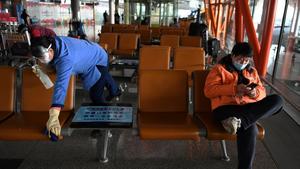 A worker (left) wearing protective gear disinfects chairs in a public area at the Beijing Capital Airport in Beijing on March 5, 2020. (GREG BAKER / AFP)
A worker (left) wearing protective gear disinfects chairs in a public area at the Beijing Capital Airport in Beijing on March 5, 2020. (GREG BAKER / AFP)
Beijing, Tianjin and neighboring Hebei province have carried out joint measures to prevent cross-infection of the novel coronavirus as an increasing number of people return to work and resume daily commutes.
"We have found six people with fever from daily checks and sent them to designated hospitals for treatment," said Wang Zhe, head of the Zhuozhou check point on an expressway linking Hebei with the capital. After passing the check point, passengers enter Beijing.
According to Wang, more than 8,000 vehicles and about 13,000 passengers underwent identification checks and health examinations at the check point on Monday. And the number, about half the normal volume, is increasing, he said.
Beijing, Tianjin and neighboring Hebei province have carried out joint measures to prevent cross-infection of the novel coronavirus as more people return to work and resume daily commutes
Beijing authorities have demanded check points increase the number of channels and take measures to prevent crowded lines during checks, according to a conference held on Monday afternoon, as reported by Beijing Daily.
ALSO READ: Premier Li seeks tighter control of cross-border infection
The check point in Zhuozhou has opened all six of its channels and has equipped 20 police officers-twice the normal number-as well as 18 medical workers per shift to ensure smooth passage, Wang said.
Wang's station is one of the seven check points in Hebei on expressways linked to Beijing. Their work, based on Beijing's policies on incoming travelers, began in January to prevent the cross-transmission of the virus.
A recent meeting of the Standing Committee of the Political Bureau of the Communist Party of China Central Committee advocated the need to improve a joint prevention and control mechanism of the Beijing-Tianjin-Hebei region, according to Xinhua News Agency.
At check points in Tongzhou district in Beijing and Yanjiao town in Sanhe city, Hebei, the volume of passengers is much bigger. About 100,000 residents in Yanjiao commute to work in Beijing every working day, Xinhua reported.
Li Guibin, head of a traffic police station that serves as a check point connecting Sanhe city and Beijing, was quoted as saying that the number of vehicles passing his station has increased to about 80 percent of its normal flow, with over 5,600 vehicles passing through it during morning rush hour.
"We have been working together with traffic police in Beijing to reduce repeated checks and improve efficiency for passengers entering the capital," Li said.
Health departments in the region have also established a communication system to share information and conduct integrated measures related to prevention efforts.
Tianjin rolled out a digital code for its residents and people entering the city. Through the codes, the health conditions of these people can be scanned, thus repeated checks can be avoided. Information from these codes will be also acknowledged in Beijing and Hebei.
To lower the risk of infection caused by imported cases, Beijing Capital International Airport set up a special zone on Tuesday morning for travelers from countries that are dealing with a serious outbreak of the virus.
READ MORE: 10 out of mainland's 24 new COVID-19 infections imported
Du Juan, Xin Wen and Yang Cheng contributed to this story.


